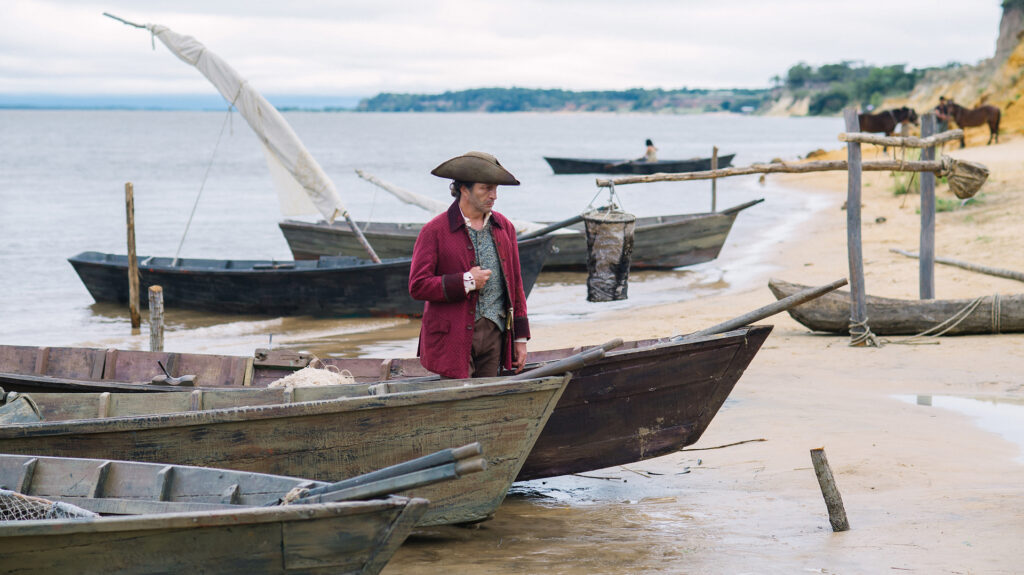In our third dispatch from this year’s New York Film Festival (the first is here, second here): the “director’s cut” version of Arnaud Desplechin’s sprawling career summation, Ismael’s Ghosts; Argentinian filmmaker Lucretia Martel makes her long-awaited return with 18th century colonialist tale Zama; and Noah Baumbach’s latest dramedy, The Meyerowitz Stories (New and Selected).
 “Meta” inadequately describes the interlacing literary and cinematic references, stories-within-stories, digressions, subplots and general convolution that comprises Arnaud Desplechin’s Ismael’s Ghosts, a dense and appealingly sloppy two hours-plus that begs for a second viewing for purposes of—excuse the awful word—unpacking. Familiar actors and Desplechin CV callbacks (from My Sex Life…, Kings and Queen and My Golden Days in particular) will please the director’s fans, but the new film resists providing anything so vulgar as “satisfaction,” especially as it wears on and its perspective becomes more indistinguishable from that of its increasingly cracked and paranoid protagonist, filmmaker Ismaël (Mathieu Amalric). And yet for a while, Ismael’s Ghosts is a borderline straightforward psychological mystery about the complacency-shattering return of Ismaël’s wife Carlotta (Marion Cotillard), who disappeared 20 years prior, detonating the lives of her husband and disconsolate father (also a noted filmmaker). Her return creates something of a love triangle, as Ismaël has settled down with astrophysicist Sylvia (Charlotte Gainsbourg) in a cozy beachfront cottage where he is writing his new film. Desplechin weaves in scenes from Ismaël’s movie, a spy thriller about a secret agent (Louis Garrel) based on Ismaël’s brother, but for this section of Ismael’s Ghosts, Desplechin is generally on his best behavior, homaging Hitchcock like a proper auteur and letting the disruption of Carlotta’s uninvited return play out on his actors’ faces.
“Meta” inadequately describes the interlacing literary and cinematic references, stories-within-stories, digressions, subplots and general convolution that comprises Arnaud Desplechin’s Ismael’s Ghosts, a dense and appealingly sloppy two hours-plus that begs for a second viewing for purposes of—excuse the awful word—unpacking. Familiar actors and Desplechin CV callbacks (from My Sex Life…, Kings and Queen and My Golden Days in particular) will please the director’s fans, but the new film resists providing anything so vulgar as “satisfaction,” especially as it wears on and its perspective becomes more indistinguishable from that of its increasingly cracked and paranoid protagonist, filmmaker Ismaël (Mathieu Amalric). And yet for a while, Ismael’s Ghosts is a borderline straightforward psychological mystery about the complacency-shattering return of Ismaël’s wife Carlotta (Marion Cotillard), who disappeared 20 years prior, detonating the lives of her husband and disconsolate father (also a noted filmmaker). Her return creates something of a love triangle, as Ismaël has settled down with astrophysicist Sylvia (Charlotte Gainsbourg) in a cozy beachfront cottage where he is writing his new film. Desplechin weaves in scenes from Ismaël’s movie, a spy thriller about a secret agent (Louis Garrel) based on Ismaël’s brother, but for this section of Ismael’s Ghosts, Desplechin is generally on his best behavior, homaging Hitchcock like a proper auteur and letting the disruption of Carlotta’s uninvited return play out on his actors’ faces.
Far from mainstream or merely diverting (Cotillard’s bizarre and jaw-dropping dance to an eminently undanceable Bob Dylan song testifies to that), this act of the film is still fully graspable. All that is rubbished once one of the three principals leaves. Focus shifts to Ismaël’s relationships with Carlotta’s father (László Szabó); his producer (Hippolyte Girardot); and his brother (also Garrel). Ismaël’s pills and booze habits seem to blur all clarity, and to simulate his hero’s seeming nervous breakdown, Desplechin employs a ragbag of techniques (time jumps, iris-ins, direct address, partial dissolves, rapid zooms, voiceover, etc.), none more aptly disorienting than the rear projection effect that makes Ismaël’s sozzled train journey—while playing hooky from his shoot—a psychedelic detour that eventually has him hallucinating in a park. The film also has room for Lacanian theory, a raving analysis of Jackson Pollock’s Lavender Mist that might be the clue to the whole thing, a trip to Tajikistan, and a head-exploding cellphone bomb. The version of Ismael’s Ghosts at NYFF is billed as the director’s cut, and it’s 20 minutes longer than the more “sentimental” cut that opened Cannes. Desplechin describes it as “five films compressed into one,” and I feel confident that at least one of them is a masterpiece. But it may well take a couple more versions to locate it. Justin Stewart
 Lucrecia Martel has done something interesting with her adaptation of Zama. While Antonio di Benedetto’s novel is renowned for its simplicity — most paragraphs are a mere sentence long — Martel’s film is full of detail; where di Benedetto cuts descriptions short (even principal characters are dubbed simply “mulatto”), Martel fills every extended shot with sumptuous palettes and soundscapes; and where, at every point, di Benedetto skirts realism with blunt mystical phenomena, Martel builds surreality out of unexplained shifts in tone and uncomfortable pacing. In other senses, Zama, the film, isn’t necessarily a departure from its source material: Martel’s episodic narrative grasps di Benedetto’s Paraguay/Chile, but transforms it into a more sedate dreamscape. The dream is often punctured by history, as colonialism and its effects are always present, keeping everyone on edge. One colonialist, Don Diego de Zama (based on a real person, but not on that person’s real story), is possessed by the need to move — both up in the ranks of his government post and away from his post at Concepción.
Lucrecia Martel has done something interesting with her adaptation of Zama. While Antonio di Benedetto’s novel is renowned for its simplicity — most paragraphs are a mere sentence long — Martel’s film is full of detail; where di Benedetto cuts descriptions short (even principal characters are dubbed simply “mulatto”), Martel fills every extended shot with sumptuous palettes and soundscapes; and where, at every point, di Benedetto skirts realism with blunt mystical phenomena, Martel builds surreality out of unexplained shifts in tone and uncomfortable pacing. In other senses, Zama, the film, isn’t necessarily a departure from its source material: Martel’s episodic narrative grasps di Benedetto’s Paraguay/Chile, but transforms it into a more sedate dreamscape. The dream is often punctured by history, as colonialism and its effects are always present, keeping everyone on edge. One colonialist, Don Diego de Zama (based on a real person, but not on that person’s real story), is possessed by the need to move — both up in the ranks of his government post and away from his post at Concepción.
Daniel Giménez Cacho plays Zama with a certain swagger that befits his personality; he’s deeply uncomfortable among the aristocratic Spanish, but also around poor natives. Zama is in-between these worlds and bitterly alone, often acting out against any perceived threat of his position with a quick gaze, folded arms, or a curled lip. As Zama’s story shifts, and his station goes from one of moderate power to grunt (he’s made to hunt for an infamous villain, Vicuña Porto, whose name is always on the lips of the villagers), Cacho must change his body language to reflect his character’s entirely different persona — one that’s defeated, but not quite humble. The colonized may finally fight back once the imperialists stretch too far into their territory, as if Frantz Fanon was leading them in Algeria. And the bureaucratic state, so fraught with their petty power struggles, once defeated, can only go to war with itself. In these scenes, Martel brings a personal touch to this material, shooting with a detached irony, focusing on landscape just as much as portraiture. The palette shifts to a dark green as Zama is finally swept away from his colonialist life and into the swampland, perhaps to live, perhaps to die. Zama illustrates Martel’s adieu to the violence that built the Chile-Paraguay border, but at the same time acknowledges the ghosts of colonialism that still haunt the land. Zach Lewis
 Fitting snugly into Noah Baumbach’s tragicomic oeuvre, The Meyerowitz Stories (New and Selected) approaches dysfunctional families with the same intuitive understanding of complex interpersonal dynamics that defined the director’s earlier films. Baumbach invokes King Lear here, as patriarch and over-the-hill artist Harold Meyerowitz (Dustin Hoffman) grapples with mortality and his legacy, while his adult children — Danny (Adam Sandler), Matthew (Ben Stiller), and Jean (Elizabeth Marvel) — work through the effect a father’s neglect (in the case of Jean, Danny) and high expectations (Matthew) has had on their lives. The focus here is on generational divisions, but the characters’ compassion overshadows their brooding dissent.
Fitting snugly into Noah Baumbach’s tragicomic oeuvre, The Meyerowitz Stories (New and Selected) approaches dysfunctional families with the same intuitive understanding of complex interpersonal dynamics that defined the director’s earlier films. Baumbach invokes King Lear here, as patriarch and over-the-hill artist Harold Meyerowitz (Dustin Hoffman) grapples with mortality and his legacy, while his adult children — Danny (Adam Sandler), Matthew (Ben Stiller), and Jean (Elizabeth Marvel) — work through the effect a father’s neglect (in the case of Jean, Danny) and high expectations (Matthew) has had on their lives. The focus here is on generational divisions, but the characters’ compassion overshadows their brooding dissent.
Physical comedy here also connects to a sense of shared physical and emotional fragility, as in one scene of sabotage against an old car; or another of a failed attempt to budge family poodle Bruno from his perch on the couch; and several scenes of the various Meyerowitzes running away from each other, always with an awkward gait. Or as in the opening scene here, in which Danny simply searches for a parking spot, his frustration visibly mounting by the moment. The scene comes to also represent the sense of change that Danny feels all around him, and his inability to control those changes; he argues with his daughter (Grace Van Patten) about a song on the radio that he says he introduced her to (she only remembers discovering it herself), and the pattern of their argument extends to the relationships elsewhere in The Meyerowitz Stories. The most poignant moments in Baumbach’s film involve one character having their sentimentality disillusioned by someone who doesn’t share their attachment. This makes the film bittersweet, but always with sense of balance: the hurt doesn’t go away, but the bonds of family outlast a resentment for mistakes made in the past. Jason Ooi


Comments are closed.